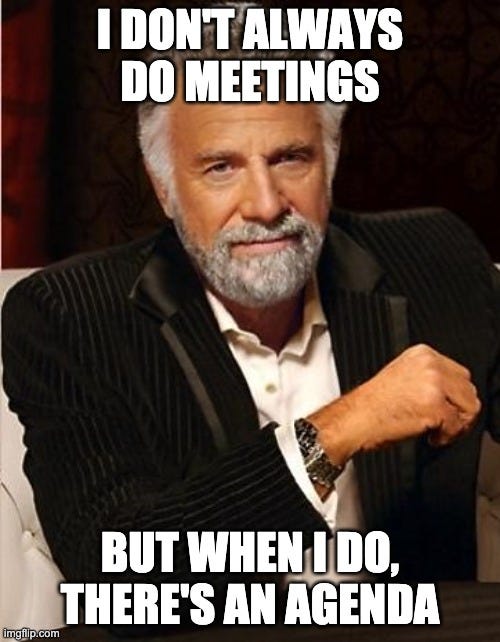Running effective meetings
If only it were "Meetings in the Time of Coronavirus" instead of "Love in the Time of Cholera"
We should participate in meetings the same way that well-coordinated sports teams, like synchronized swimmers or football players, compete and perform. Though individuals train and improve independently, the team can only be successful in performance if they trust one another and pay attention to rapid shifts in tension and position. In the collaborative mental exercises that is a meeting, this translates to taking in the problems and proposals being shared, actively listening instead of passively hearing, and leveraging the expertises of the participants. Here are some ways I think we can apply these ideas in different types of meetings, especially those scheduled recurringly.
Standups: I admit this is not the most traditional example, but pandemic-era Zoom standups can be the most difficult meeting of the day, especially for larger teams. There's a fine line between sharing progress and sharing your calendar, and we can all make standup better by emphasizing problems encountered and learnings made. For example, if I mention difficulties in identifying the root cause of a triage ticket, a teammate who is a subject-matter expert in that area can quickly point me to a specific piece of code to delve into further; if I reviewed a spec or proposal that affects an ongoing project, I should share that and flag it to the relevant people to take a look. Effective standup narratives also facilitate context-sharing, and can be an accessible and convenient (though low-fidelity) way of spreading high-level domain knowledge, e.g. dependencies of a system, downstream consumers, recent incidents, etc.
Cross-functionals: Effective cross-functional meetings should provide clear updates on progress and obstacles relevant to most, if not all, of the parties present. As an engineer, a cross functional meeting can be an effective forum to review and clarify design and product requirements for a large feature of the project; however, it is not an effective use of time to go over engineering solutions to engineering problems--take this conversation to an engineering-only standup please! If not careful, cross-functional meetings may also be a breeding ground for the bad habit of hearing instead of listening. This arises when each functional group is so focused on sharing their own updates and concerns, that we fail to accurately understand the project state as a whole. This results in fragmented perceptions of progress and hinders discussions to improve processes and project management. Cross-functionals are like the final boss: we need to employ every skill and technique in the book to keep them productive. Aside from the usual advice of inviting only the necessary people, taking notes, and recording AIs, we have to go one step further and aggressively side-step items that don't positively contribute to everyone's shared knowledge.
1:1s: Building meaningful 1:1s is an art. Unlike the aforementioned meetings, cultivating a sense of relaxation and closeness is necessary and also often the reason for scheduling recurring 1:1s. To create such an environment, you and the other person must demonstrate over multiple encounters that you are listening to and respecting what's being shared. As with all personal conversations, it's especially important to participate in the performative acts, like nodding and making eye contact. I always try to ask something personal (but not invasive) to warm up, then get into the meat of things: updates, difficulties, and problem solving, and try to end on a positive note, leaving enough time to wrap up without an abrupt halt. If done respectfully and with advance notice, I also think there's nothing wrong with skipping a 1:1. Nothing is worse than 30 minutes of lukewarm smalltalk simply because you or the other person don't have the current headspace to participate in a focused conversation. This does vary company to company, so use your best judgement and follow the norms of your work culture.
Meetings, the epitome of can't live with them, but can't live without them. Thankfully, there are tons of resources in books, blogs, and journals to help you navigate this crucial work skill. I hope I've framed meetings in a way here that helps you and your team to be more focused and intentional. Being deliberate is hard, and for those of you in meetings all day, it's physically impossible to practice everything that I've suggested here in every meeting. That's perfectly OK--we make do with what time and energy we have, and do our best when we can. Tell me, which meetings do you look forward to every week, and which, not so much?
Written by Bridget



